Omega-3s for PTSD: Supporting Brain Health and Emotional Balance
Introduction
Post-Traumatic Stress Disorder (PTSD) is not just psychological—it’s also deeply biochemical. Trauma rewires the brain’s chemistry, alters neurotransmitters, and inflames the nervous system, making it harder to think clearly, regulate emotions, or feel safe in your own body.
While therapy and mindfulness are foundational for healing, nutrition plays a crucial role in rebuilding brain health. Among the most studied nutrients for trauma recovery are Omega-3 fatty acids—essential fats found in fish, algae, and flaxseed.
Research shows that Omega-3s can reduce anxiety, improve mood, and support neuroplasticity—the brain’s ability to adapt and recover after trauma. In this article, we’ll explore how Omega-3s influence PTSD, their effects on inflammation, stress hormones, and emotional balance, and how you can use them to support your recovery naturally.
Looking for supplements for This? Click here.
🌪️ PTSD and the Brain: When Trauma Rewires the System

PTSD develops when the brain’s alarm system—the amygdala, hippocampus, and prefrontal cortex—fails to reset after a traumatic experience.
The amygdala stays overactive, constantly detecting danger.
The prefrontal cortex, which normally calms the fear response, becomes less active.
The hippocampus, responsible for contextual memory, often shrinks, leading to flashbacks and distorted time perception.
At the same time, chronic stress disrupts neurotransmitters like serotonin, dopamine, and GABA, and floods the body with cortisol and adrenaline.
This biochemical chaos leaves trauma survivors feeling anxious, numb, hypervigilant, or emotionally unstable.
Omega-3 fatty acids play a powerful role here—they help rebuild neuronal membranes, reduce inflammation, and stabilize mood-regulating chemicals in the brain.
🧬 What Are Omega-3 Fatty Acids?
Omega-3s are a group of polyunsaturated fats that are essential for human health. The body can’t produce them on its own, so they must come from food or supplements.
The three main types of Omega-3s are:
ALA (alpha-linolenic acid): Found in flaxseed, chia seeds, and walnuts.
EPA (eicosapentaenoic acid): Found in fatty fish and algae; reduces inflammation and supports emotional health.
DHA (docosahexaenoic acid): The primary structural fat in the brain and retina, essential for cognition and nerve repair.
For trauma recovery, EPA and DHA are the most important.
🧠 How Omega-3s Affect the Brain in PTSD
Rebuilding Brain Cell Membranes
Every neuron in your brain is surrounded by a fatty membrane that affects how well it communicates. DHA improves the fluidity of these membranes, making neurotransmission smoother and more efficient.
Reducing Neuroinflammation
Chronic trauma raises inflammatory molecules called cytokines, which can impair cognition and mood. Omega-3s reduce these cytokines and help restore normal immune signaling in the brain.
Balancing Neurotransmitters
EPA increases the availability of serotonin and dopamine, both essential for emotional regulation and motivation. This can ease symptoms like sadness, irritability, and emotional flatness.
Supporting Neuroplasticity
Omega-3s boost BDNF (brain-derived neurotrophic factor), a protein that promotes neural growth and repair. This helps the brain “rewire” itself after trauma—literally forming new, healthier pathways of thought and emotion.
Stabilizing Cortisol and the HPA Axis
By regulating cortisol levels, Omega-3s support a more balanced stress response, reducing hyperarousal and fatigue.
⚖️ The Science: Omega-3s and PTSD
Several studies have shown promising results linking Omega-3s to reduced PTSD symptoms:
Ursano et al. (2010): Omega-3 supplementation improved emotional stability and reduced intrusive memories in trauma survivors.
Matsuoka et al. (2011): Patients receiving EPA and DHA after trauma exposure had significantly lower rates of developing PTSD.
Kiecolt-Glaser et al. (2011): Omega-3s reduced inflammation and anxiety in medical students under chronic stress.
Rosenblat et al. (2019): Found that EPA-rich Omega-3s improved mood and cognitive flexibility in those with stress-related disorders.
These findings suggest Omega-3s not only support mood but also protect against the long-term biological effects of trauma.
🌿 Omega-3s and Emotional Regulation
One of the hardest parts of living with PTSD is emotional instability—swinging between numbness, fear, and irritability. Omega-3s may help regulate this by balancing neurotransmitters and calming overactive brain circuits.
EPA appears to have a stronger effect on mood and anxiety.
DHA supports overall brain structure and long-term resilience.
A healthy Omega-3 intake may also reduce reactivity to triggers, helping the brain differentiate between past danger and present safety.
🌙 Omega-3s and Sleep
Sleep problems are a hallmark of PTSD. Research shows DHA contributes to melatonin production and stabilizes sleep-wake rhythms. Low DHA levels are linked to insomnia, nightmares, and restless sleep.
Taking Omega-3s can help improve sleep quality and promote more restorative rest—an essential part of emotional recovery.
💡 Omega-3s and Cortisol: Calming the Stress Response
The stress hormone cortisol plays a central role in PTSD. High cortisol damages neurons in the hippocampus and prevents the body from fully relaxing.
Omega-3s help by:
Reducing cortisol spikes during stress
Improving HPA-axis feedback sensitivity
Supporting adrenal recovery
Studies show that people with higher Omega-3 levels tend to have lower cortisol reactivity, meaning they recover faster after stressful events.
🩹 Omega-3s and Inflammation: Healing the Body from the Inside Out
PTSD isn’t just a mental condition—it’s a full-body inflammatory disorder. Chronic stress increases levels of C-reactive protein (CRP) and interleukin-6 (IL-6), both markers of systemic inflammation.
Omega-3s—especially EPA—act as anti-inflammatory agents, converting into compounds called resolvins and protectins that literally “turn off” inflammation.
This not only supports mental health but also protects the heart, joints, and immune system, which often suffer during long-term stress.
🧘 How Omega-3s Support the Healing Process
Healing from trauma is about restoring regulation—the ability to feel stress without being overwhelmed.
Omega-3s help by:
Improving the brain’s adaptability (neuroplasticity)
Enhancing emotional resilience
Reducing anxiety and fatigue
Supporting a calmer, more balanced mood
Many trauma-informed therapists recommend combining Omega-3 supplementation with mindfulness, somatic work, and EMDR therapy, since a healthy brain responds better to emotional reprogramming.
🍣 Natural Sources of Omega-3 Fatty Acids
Top food sources:
Fatty fish: salmon, sardines, mackerel, anchovies, trout
Plant-based options: flaxseed, chia seeds, hemp seeds, walnuts
Algae oil: vegan source of EPA and DHA
For therapeutic benefits, it’s often hard to reach adequate levels through food alone—especially for DHA. That’s where supplementation helps.
💊 Omega-3 Supplements: What to Look For
When choosing a supplement, quality matters. Here’s what to check:
EPA to DHA Ratio
For mood and PTSD, studies suggest a ratio of 2:1 (EPA:DHA) is most effective. Aim for:
EPA: 1000–2000 mg daily
DHA: 500–1000 mg daily
Purity and Sustainability
Look for brands that test for heavy metals and oxidation. Certifications like IFOS (International Fish Oil Standards) ensure purity.
Form
Triglyceride or re-esterified triglyceride form absorbs better than ethyl ester.
Algae oil is a clean vegan alternative with high DHA content.
Timing
Take Omega-3s with meals containing fat to improve absorption.
🌿 Combining Omega-3s with Other Nutrients

Omega-3s work synergistically with other nutrients that support brain chemistry and trauma recovery:
Magnesium – Calms the nervous system and enhances GABA.
Vitamin D – Boosts serotonin synthesis and immune balance.
B-Complex – Supports neurotransmitter synthesis and energy metabolism.
Zinc – Regulates mood and hormone function.
Antioxidants (Vitamin C, CoQ10) – Protect the brain from oxidative damage caused by chronic stress.
Combining these nutrients amplifies the healing effects of Omega-3s.
Looking for supplements for This? Click here.
🌅 How Long Does It Take to See Results?
Most studies show measurable improvements in 4–8 weeks of consistent Omega-3 supplementation.
Early effects often include:
Calmer mood and reduced anxiety
Better sleep quality
Improved focus and emotional stability
Long-term use helps rebuild neural pathways, supporting deeper emotional regulation and trauma recovery.
⚠️ Precautions and Side Effects
Omega-3s are generally safe, but keep these in mind:
Blood-thinning: High doses may increase bleeding risk; consult your doctor if taking anticoagulants.
Digestive discomfort: Mild nausea or fishy aftertaste can occur; freezing capsules or choosing enteric-coated ones can help.
Balance: Excess Omega-6 (from processed oils) can counteract Omega-3 effects—reduce vegetable oils like corn, soybean, and sunflower.
Always consult a healthcare provider before starting supplementation, especially if taking medication.
🧘 Lifestyle Tips to Boost Omega-3 Benefits
Prioritize sleep – Healing happens when the brain rests and detoxifies.
Practice mindfulness – Deep breathing increases vagal tone and reduces inflammation.
Want to try Breathwork? Click Here.
Exercise regularly – Movement increases BDNF, similar to Omega-3s.
Eat anti-inflammatory foods – Berries, turmeric, and leafy greens support brain recovery.
Limit alcohol and sugar – Both deplete essential fatty acids and worsen anxiety.
These habits enhance Omega-3 absorption and amplify its benefits for the nervous system.
🌈 Integrating Omega-3s into PTSD Recovery
A complete healing strategy involves:
Therapy: EMDR, somatic work, CBT, or trauma-informed counseling.
Nutrition: Whole foods rich in Omega-3s, protein, and antioxidants.
Supplements: EPA/DHA plus supportive nutrients like magnesium and vitamin D.
Mind-body practices: Breathwork, yoga, journaling, grounding techniques.
Together, they help the body move from survival to restoration.
💫 Long-Term Healing: Rebuilding Trust in the Body
Omega-3s do more than nourish the brain—they rebuild the biological foundation of calm. By restoring cell membrane health and reducing inflammation, they make it possible for therapy and emotional work to take deeper root.
As the nervous system learns safety again, symptoms like hyperarousal, emotional numbness, and anxiety begin to fade.
Healing from trauma isn’t about erasing the past—it’s about giving the body the tools to feel balanced in the present. Omega-3s help create that internal stability.
🌿 Key Takeaways
PTSD alters brain chemistry and increases inflammation.
Omega-3s (EPA and DHA) rebuild neurons, reduce cortisol, and regulate mood.
Studies show significant improvements in anxiety, sleep, and emotional resilience.
The best results come from consistent use and integration with therapy and healthy lifestyle habits.
With patience and consistency, Omega-3s can help your brain relearn what peace feels like—and that’s the foundation of recovery. 🌊
Looking for online therapy ? Click Here.
🧾 References
Matsuoka Y, et al. “Omega-3 fatty acids for prevention of posttraumatic stress disorder after accidental injury.” J Clin Psychopharmacol. 2011.
Kiecolt-Glaser JK, et al. “Omega-3 supplementation lowers inflammation and anxiety.” Brain Behav Immun. 2011.
Raison CL, Miller AH. “Inflammation and stress-related disorders.” Am J Psychiatry. 2013.
Rosenblat JD, et al. “Role of omega-3 fatty acids in depression and stress regulation.” Mol Psychiatry. 2019.
Yehuda R. “Post-traumatic stress disorder: neuroendocrine aspects.” Psychoneuroendocrinology. 2015.
van der Kolk, Bessel A. The Body Keeps the Score. Viking, 2014.
Ursano RJ, et al. “Neurobiology of trauma and resilience.” Nat Rev Neurosci. 2010.
Freeman MP. “Omega-3s and psychiatric disorders.” Am J Psychiatry. 2017.
Larrieu T, Layé S. “Food for mood: relevance of nutritional omega-3 fatty acids for depression and anxiety.” Front Physiol. 2018.
National Center for PTSD. “Nutrition and Stress Recovery.” U.S. Department of Veterans Affairs, 2022.
Related Posts
-
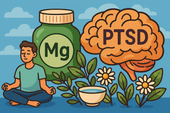
Magnesium and PTSD: Calming the Nervous System
Magnesium is one of the body’s most powerful natural stress relievers. 🌿 Learn how this essential mineral helps calm the nervous system, lower cortisol, ease anxiety, and support better sleep—making it a key ally for anyone recovering from trauma or PTSD.
-
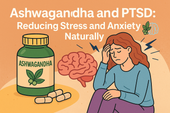
Ashwagandha and PTSD: Reducing Stress and Anxiety Naturally
Ashwagandha offers a natural path to stress and trauma recovery by calming the body’s stress response and restoring hormonal balance. 🌿 Learn how this powerful adaptogen can lower cortisol, ease anxiety, improve sleep, and support emotional resilience for those healing from PTSD.
-
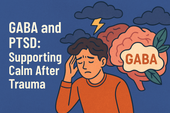
GABA and PTSD: Supporting Calm After Trauma
Therapy helps the brain rewire after trauma, restoring safety and self-trust. 🛋️ Discover how modern therapeutic approaches—like EMDR, CBT, and somatic therapy—help regulate the nervous system, calm intrusive memories, and rebuild emotional resilience for people recovering from PTSD and chronic stress.
-
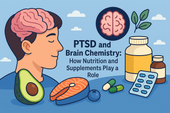
PTSD and Brain Chemistry: How Nutrition and Supplements Play a Role
PTSD isn’t just psychological—it’s deeply biological. 🧠 Learn how trauma reshapes brain chemistry and how nutrition, omega-3s, magnesium, B vitamins, and adaptogens can help rebalance neurotransmitters, reduce inflammation, and support emotional recovery from the inside out.
-
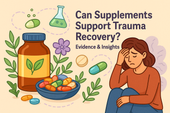
Can Supplements Support Trauma Recovery? Evidence & Insights
Can nutrients like Vitamin D and Zinc really support trauma recovery? 🌞 These two essential micronutrients play powerful roles in immune balance, inflammation control, and hormonal stability—all key systems disrupted by chronic stress and trauma. Learn how replenishing them can help restore strength and emotional resilience.
-
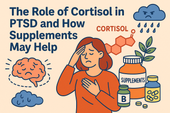
The Role of Cortisol in PTSD and How Supplements May Help
Your adrenal glands play a vital role in how your body responds to stress—but when they’re overworked, fatigue and anxiety can follow. 🌿 Learn how to support adrenal health naturally with nutrients, adaptogens like ashwagandha and rhodiola, and lifestyle habits that restore hormonal balance and steady energy.
-
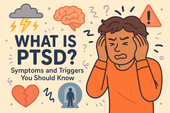
What Is PTSD? Symptoms and Triggers You Should Know
Post-Traumatic Stress Disorder (PTSD) can affect anyone who has experienced deep emotional or physical trauma. 🌪️ Learn how PTSD develops, what symptoms to look for, and the triggers that reignite distress—plus how understanding your body’s response to trauma is the first step toward healing and recovery.
-

Creating a Daily Supplement Stack for Stress and Cortisol Management: A Science-Based Guide
Building a daily supplement stack for stress and cortisol management can help restore balance, focus, and calm in your life. 🌿 Learn how adaptogens, magnesium, omega-3s, and other key nutrients support your body’s natural stress response from morning to night—so you can feel grounded, energized, and resilient every day.
-
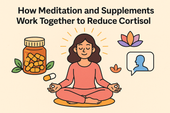
How Meditation and Supplements Work Together to Reduce Cortisol: A Complete Guide to Calming the Mind and Body
Meditation and supplements can work hand in hand to naturally reduce cortisol, your body’s main stress hormone. 🌿 Learn how mindfulness practices, adaptogenic herbs, and nutrient support like magnesium, omega-3s, and B vitamins create a powerful synergy for calm, focus, and emotional balance—backed by science and daily rituals that truly reset your stress response.
-
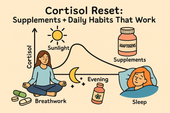
Cortisol Reset: Supplements + Daily Habits That Work
-
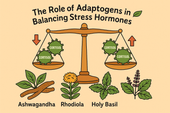
The Role of Adaptogens in Balancing Stress Hormones
Adaptogens work at the root of stress — your nervous system. 🌿 Learn how these powerful herbs help regulate cortisol, calm your nerves, and restore balance between energy and relaxation. ✨
-
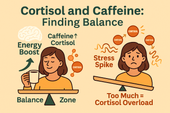
Cortisol and Caffeine: How Much Is Too Much?
Caffeine can boost energy and focus — but too much can overstimulate your stress hormones. ☕ Learn how caffeine affects cortisol, energy levels, and mood, and discover how to find the perfect balance for lasting calm and clarity. 🌿
-
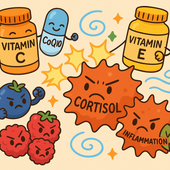
Antioxidants for Stress Management and Cortisol Control
When stress overwhelms your body, antioxidants come to the rescue. 🌿 Learn how vitamin C, CoQ10, and other natural compounds help reduce oxidative stress, regulate cortisol, and restore calm energy from within. ✨
-
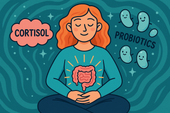
Cortisol and Gut Health: How Probiotics May Help
Chronic stress doesn’t just affect your mind — it changes your gut. 🌿 Learn how cortisol disrupts the microbiome and how probiotics can help restore balance, improve digestion, and calm your stress response naturally. ✨
-

Vitamin D and Cortisol: Supporting Immune Balance
Vitamin D does more than strengthen bones — it helps regulate cortisol and support immune balance. 🌞 Learn how this essential hormone-like nutrient restores calm, improves mood, and strengthens your body’s natural stress defenses. 🌿
-
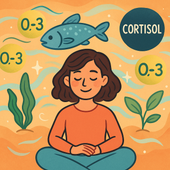
Omega-3s and Cortisol: Fighting Inflammation Naturally
Omega-3s are more than heart-healthy fats — they’re natural cortisol regulators. 🌿 Learn how EPA and DHA help reduce chronic inflammation, calm the nervous system, and support stress recovery from the inside out. ✨
-
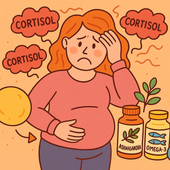
High Cortisol and Belly Fat: Can Supplements Help?
Chronic stress can make belly fat harder to lose — but supplements like ashwagandha, magnesium, and omega-3s may help restore cortisol balance. 🌿 Learn how science-backed nutrients support fat metabolism, calm your stress response, and bring your body back into harmony. ✨
-

How Ginseng Can Support Energy and Cortisol Balance
Ginseng is one of nature’s most powerful adaptogens, helping your body handle stress without burning out. 🌿 Learn how this ancient root supports balanced cortisol, steady energy, and sharper focus — restoring vitality naturally and sustainably. ✨
-
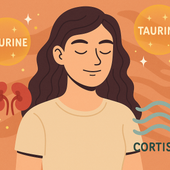
Taurine and Cortisol: Supporting Focus Under Stress
When cortisol surges, focus fades — but taurine helps restore balance. 🌿 Learn how this powerful amino acid calms your nervous system, regulates stress hormones, and sharpens concentration without jitters or fatigue. ✨
-
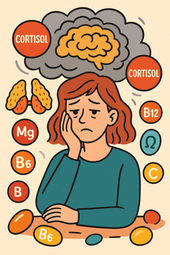
The Link Between Cortisol, Brain Fog, and Nutrient Deficiencies
When brain fog sets in, it’s not just in your head — it’s in your hormones. 🌿 Discover how cortisol imbalance and nutrient deficiencies like low magnesium, B vitamins, and omega-3s can cloud your focus and how restoring balance brings back mental clarity and calm. ✨
-

B Vitamins for Stress, Energy, and Cortisol Regulation
B vitamins are the foundation of stress resilience and steady energy. 🌿 Learn how this essential group of nutrients helps regulate cortisol, restore focus, and keep your nervous system calm — giving you balance from the inside out. ✨
-

Cortisol Imbalance and Chronic Fatigue: Can Supplements Help?
When chronic stress keeps cortisol high, fatigue and brain fog follow. 🌿 Learn how to rebalance your stress hormones naturally with calming nutrients, adaptogens, and lifestyle rituals that restore energy, focus, and inner peace. ✨
-

Adaptogen Stacks for Better Sleep and Lower Stress Hormones
Adaptogens can help your body recover from stress and sleep better by regulating key hormones like cortisol and adrenaline. 🌿 Learn how adaptogen stacks work to restore balance, calm the mind, and rebuild resilience — so you can rest deeply and wake renewed. ✨
-

Phosphatidylserine for Nighttime Cortisol Control
When stress hormones stay high at night, deep rest becomes impossible. 🌙 Discover how phosphatidylserine helps calm the brain, reduce nighttime cortisol, and restore healthy sleep rhythms — so you can wake up peaceful, clear, and recharged. ✨
-

Magnesium for Stress Relief and Cortisol Reduction
Magnesium is one of the most powerful natural tools for stress relief. 🌿 This essential mineral calms your nervous system, lowers cortisol, and helps your body recover from chronic tension. Learn how magnesium replenishes balance, improves sleep, and restores inner peace — naturally. ✨
-

Supplements to Improve Sleep by Balancing Cortisol
When cortisol stays high at night, sleep becomes a struggle. 🌙 Discover natural supplements that calm the nervous system, lower stress hormones, and restore your body’s natural rhythm. From magnesium and ashwagandha to L-theanine and phosphatidylserine, learn how to build deeper, more restorative rest. 🌿
-

Cortisol and Sleep: Why Stress Keeps You Awake
When stress keeps your body in fight-or-flight mode, cortisol refuses to calm down — and sleep becomes impossible. 🌙 Learn how elevated cortisol disrupts your circadian rhythm, suppresses melatonin, and turns restless nights into exhaustion. Discover how to restore balance and reclaim deep rest. ✨
-

L-Theanine for Cortisol Balance and Anxiety Relief
L-Theanine — the calming amino acid from green tea — helps quiet the mind and balance cortisol, the body’s key stress hormone. 🌿 Learn how it promotes calm focus, eases anxiety, and supports deep rest without sedation, backed by modern research and centuries of tradition. ✨
-

Rhodiola Rosea and Stress Resilience: A Natural Cortisol Regulator
Rhodiola rosea is one of nature’s most powerful tools for resilience. 🌿 This Arctic root helps balance cortisol, fight fatigue, and sharpen focus — keeping you calm yet energized even under stress. Discover the science behind Rhodiola’s adaptogenic power and how it helps your body thrive under pressure. ✨
-

Ashwagandha for Cortisol Balance: What the Science Says
Ashwagandha helps your body recover from chronic stress by calming the adrenal system and balancing cortisol — your key stress hormone. 🌿 Learn what science says about this powerful adaptogen, how it restores energy and focus, and why it’s one of nature’s most effective tools for modern stress relief. ✨
-

Supplements That Naturally Lower Cortisol Levels
When cortisol levels calm, your energy transforms — no more crashes or jitters, just steady focus and inner peace. 🌿 Learn which natural supplements and habits lower stress hormones, boost calm energy, and help your body thrive with balance instead of burnout. ✨
-

What Is Cortisol Imbalance? Symptoms You Shouldn’t Ignore
Cortisol — your body’s main stress hormone — keeps you alert and energized, but when it’s out of balance, it can drain your health. 🌿 Learn the signs of cortisol imbalance, from fatigue and anxiety to sleep disruption and stubborn weight gain, and discover how to restore calm, energy, and hormonal harmony naturally. ✨
-

The Best Daily Multivitamins for Menopausal Women
Menopause brings new nutritional needs that your old vitamin routine may no longer meet. 🌿 Discover how the right daily multivitamin can boost energy, balance mood, support bone and heart health, and keep your skin glowing. Learn which nutrients truly matter — from vitamin D to magnesium and B12 — to feel strong and vibrant every day. ✨
-

Antioxidants and Menopause: Fighting Inflammation Naturally
During menopause, oxidative stress and inflammation can quietly accelerate aging, fatigue, and skin changes. 🌿 Learn how antioxidants — from vitamins C and E to polyphenols in berries and green tea — help neutralize free radicals, reduce inflammation, and restore balance naturally. Discover the science of radiant, resilient aging. ✨
-

How CoQ10 Supports Heart Health After Menopause
After menopause, heart health becomes more important than ever. ❤️ Discover how CoQ10 — your body’s natural energy molecule — supports cardiovascular strength, restores vitality, and protects against oxidative stress. Learn how this essential nutrient helps keep your heart energized, balanced, and resilient through every stage of life. 🌿
-

Collagen Supplements for Skin and Joint Health Post-Menopause
After menopause, collagen loss affects both skin elasticity and joint comfort — but supplements can help rebuild from within. 🌸 Learn how collagen peptides, vitamin C, and other nutrients work together to restore firmness, reduce stiffness, and keep you glowing and mobile well into your next chapter. ✨
-

Calcium and Vitamin D: Protecting Bone Health in Menopause
Menopause brings hormonal changes that can weaken bones—but with the right nutrients, strength and stability can be rebuilt. 🦴 Learn how calcium and vitamin D work together to protect bone density, prevent fractures, and keep your body resilient. This guide explores nutrition, sunlight, and lifestyle habits that help your bones stay strong and vibrant for years to come. ☀️💪
-

Adaptogens for Energy and Resilience During Menopause
Feeling drained or emotionally scattered during menopause? 🌿 Discover how adaptogenic herbs like Ashwagandha, Rhodiola, and Ginseng can restore energy, balance cortisol, and build emotional resilience. Learn how these natural allies work with your body—not against it—to help you stay strong, focused, and calm through life’s hormonal changes. 🌸
-

Supplements That Help Beat Menopause Fatigue
Menopause fatigue can feel like more than tiredness—it’s a total energy crash. This guide explores how specific supplements, mindful breathwork, and therapy can help restore balance. Learn how nutrients like B vitamins, magnesium, and adaptogens rebuild your stamina, while breathwork and emotional healing calm your nervous system and bring vitality back to your days. 🌿✨
-

Herbal Blends for Menopausal Restlessness: Finding Calm in Transition
Herbal blends bring the wisdom of nature into moments of rest and renewal. Discover how soothing herbs like chamomile, lemon balm, and ashwagandha work together to calm menopausal restlessness, balance hormones, and invite deep relaxation. 🌿💫
-

Magnesium + Glycine for Deep Sleep During Menopause
Nutrients like magnesium, glycine, and B vitamins form the foundation for deep, restorative sleep during menopause. Discover how these natural compounds calm your nervous system, balance hormones, and help you wake up refreshed and recharged. 🌿💤
-

Melatonin and Menopause: Restoring Your Sleep Cycle
Nutrients are the foundation of hormone balance and energy. Learn how vitamins, minerals, and whole foods like greens, salmon, and berries nourish women’s bodies during menopause and beyond — restoring vitality, mood, and strength. 🌿🥗
-

How L-Theanine Helps With Menopausal Anxiety
Science continually deepens our understanding of the human body, from hormones to neurotransmitters. Discover how evidence-based research shapes modern wellness — bridging natural medicine, neuroscience, and hormone balance for healthier living. 🔬🌿
-

Can Ginkgo Biloba Improve Memory in Menopausal Women?
Hormone therapy can be a powerful tool for easing menopause symptoms and restoring balance. Learn how it works, the types available, and how to combine it safely with lifestyle and natural support for optimal well-being. 🌸💊
-

B Vitamins for Mental Clarity During Menopause
Nutrients are the foundation of mental and physical balance during menopause. Discover how vitamins, minerals, and whole foods like leafy greens, fish, nuts, and citrus can fuel energy, clarity, and calm while supporting hormonal health. 🌿✨
-

Mood Swings and Menopause: Natural Nutrient Support
Probiotics do more than support digestion — they help balance mood, hormones, and immunity too. Learn how a healthy gut microbiome can ease menopause symptoms, boost energy, and improve emotional resilience naturally. 🌿🦠
-

Brain Fog in Menopause: Supplements That May Help
Supplements can be powerful allies in restoring balance, energy, and focus—especially during menopause. Learn how nutrients like omega-3s, vitamin D, magnesium, and herbal adaptogens work together to support brain health, reduce stress, and promote lasting vitality. 🌿💊
-

Adaptogen Stacks for Reducing Night Sweats
Hormone detox isn’t about cleansing your body—it’s about restoring flow. Learn how the liver, gut, and endocrine systems work together to eliminate hormone buildup and how herbs like milk thistle, dandelion, and schisandra support balance, clarity, and natural vitality. 🌿💫
-

Cooling Menopause Symptoms with Herbal Support
Ashwagandha is one of nature’s most powerful adaptogens, helping women manage stress, sleep better, and balance hormones naturally. Discover how this ancient root supports calm energy, emotional resilience, and relief from menopause-related anxiety and fatigue. 🌿💫

















































